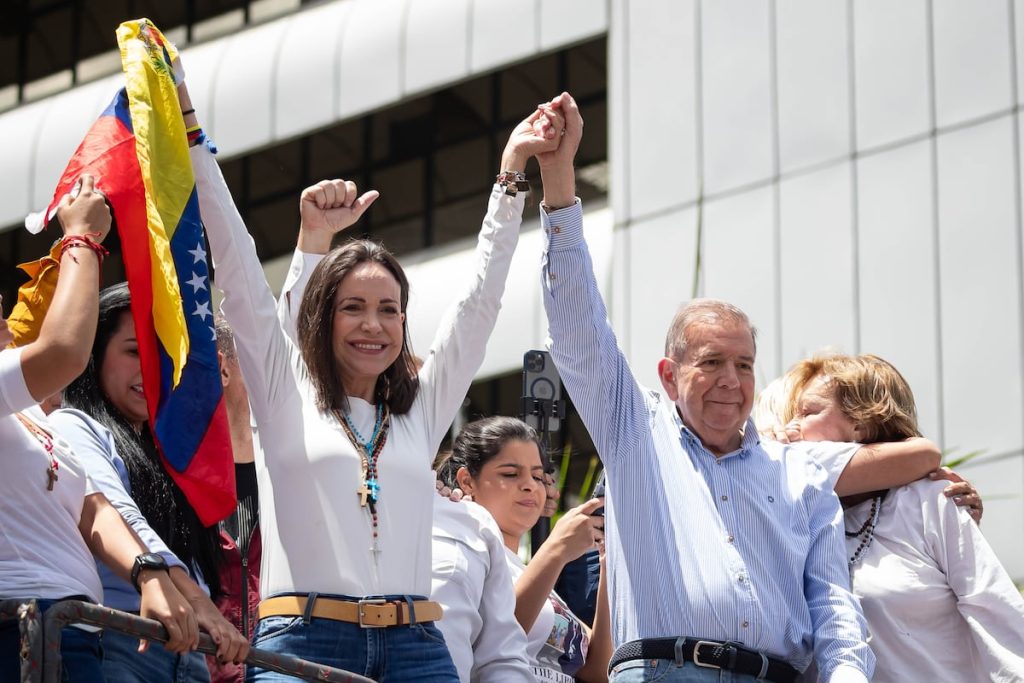Edmundo González Urrutia was a retired Venezuelan diplomat who preferred not to bother anyone. He was quiet and reserved, not one to initiate conversations, but would respond with a timid smile when spoken to. He was one of the last career diplomats left in the Venezuelan Foreign Ministry, as most of his colleagues had been replaced by officials loyal to President Hugo Chávez. He enjoyed joking and having fun with those he trusted, although there were not many left. He had a knack for making jokes and liked to share anecdotes about prominent political figures he had met in his career. He missed playing tennis and spent his time reading and writing scholarly books that would end up collecting dust on shelves. Retirement loomed ahead, seemingly tranquil and uneventful.
Almost 20 years later, at the age of 74, Edmundo unexpectedly found himself at the center of Venezuelan political life. He had been advising the opposition from a distance, until opposition leader María Corina Machado, who was disqualified from holding public office, persuaded him to run against President Nicolás Maduro in the 2024 presidential elections. Against all odds, Edmundo defeated Maduro, who refused to accept the results and vowed to remain in power from January 10, 2025, causing international outcry, particularly from the United States. Edmundo, a modest and discreet figure, would find himself leading a historic moment in a time of turmoil.
His sudden departure to Spain last Saturday, orchestrated by former Spanish President José Luis Rodríguez Zapatero and the Spanish ambassador in Caracas, Ramón Santos, caught the world by surprise. Despite being portrayed as a routine asylum request, Edmundo’s departure was anything but ordinary. It was a strategic move involving negotiations with key figures in the Maduro regime. Facing threats of arrest and persecution from the Venezuelan government, Edmundo chose exile as a means of ensuring his safety and continuing his political engagement from abroad.
Edmundo’s departure has shifted the political landscape in Venezuela, forcing the opposition to reconsider its strategies. While Machado, a hardline opposition leader, understood and respected Edmundo’s decision on a personal level, they differed politically. Machado expected Edmundo to stay in Caracas and continue the fight for change alongside her, but his exit prompted a change in plans. Machado would now lead the internal resistance, while Edmundo would work to internationalize the conflict from abroad. Two individuals united by a common cause, yet with differing political approaches, reflecting a broader spectrum within the opposition.
The controversy surrounding Edmundo’s exile brought Venezuela to the forefront of Spanish politics, triggering debates and actions within the Spanish government and parliament. The arrival of Edmundo and his wife, Mercedes López, in Spain added to the already substantial Venezuelan community in the country, sparking reactions from various political actors. While some viewed Edmundo’s exile as a humanitarian gesture, others criticized it as a move that favored the Venezuelan dictatorship. The political fallout extended beyond social media, manifesting in parliamentary debates and diplomatic tensions between Spain and Venezuela.
Navigating the complex web of Spanish-Venezuelan relations, political pressures, and internal opposition dynamics, Edmundo finds himself in a precarious position. Balancing the demands of various stakeholders, including the Spanish government, the Venezuelan opposition, and his own conscience, Edmundo must chart a course that aligns with his beliefs and aspirations for Venezuela. As he grapples with international scrutiny, diplomatic challenges, and personal sacrifices, Edmundo’s journey unfolds as a testament to the complexities of political engagement in a rapidly changing world.


